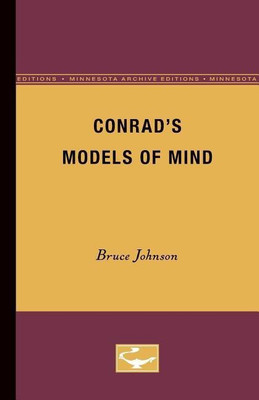Conrad's Models of Mind(English, Paperback, Johnson Bruce)
Quick Overview
Product Price Comparison
Conrad's Models of Mind was first published in 1971. Minnesota Archive Editions uses digital technology to make long-unavailable books once again accessible, and are published unaltered from the original University of Minnesota Press editions. In a new approach to understanding the psychological assumptions that lie behind the creation of a work of fiction, Professor Johnson analyzes a number of Joseph Conrad's novels and short stories, identifying and explaining Conrad's changing conceptions or models of mind. As he points out in his introduction: "Every writer makes assumptions about the nature of the mind, whether they may be elaborate theories, metaphors that seem simple but imply a great deal, downright beliefs, or vague gestalten. And such assumptions color his whole creation, the way his characters think and feel and react, possibly even his choice of subject matter." The author traces Conrad's steady progression away from deductive psychology, involving such entities as will, passion, ego, or sympathy, toward a flexible, and, for the period, new psychology that had implications for his entire development as a writer. Professor Johnson finds certain affinities between Conrad's models of mind and those of a number of other writers, among them, Schopenhauer, Sartre, and Pascal. He shows that one aspect of Conrad's psychology was closely allied to the Schopenhauerian concept of will but that when he wrote Lord Jim, Heart of Darkness, and Nostromo Conrad moved toward an existential concept of self-image and self-creation similar to Sartre's psychology in Being and Nothingness. Finally, Professor Johnson examines Conrad's novel The Rescue and shows how hopeless it was for Conrad to return to earlier conceptions of mind after he had explored the new existential models.


